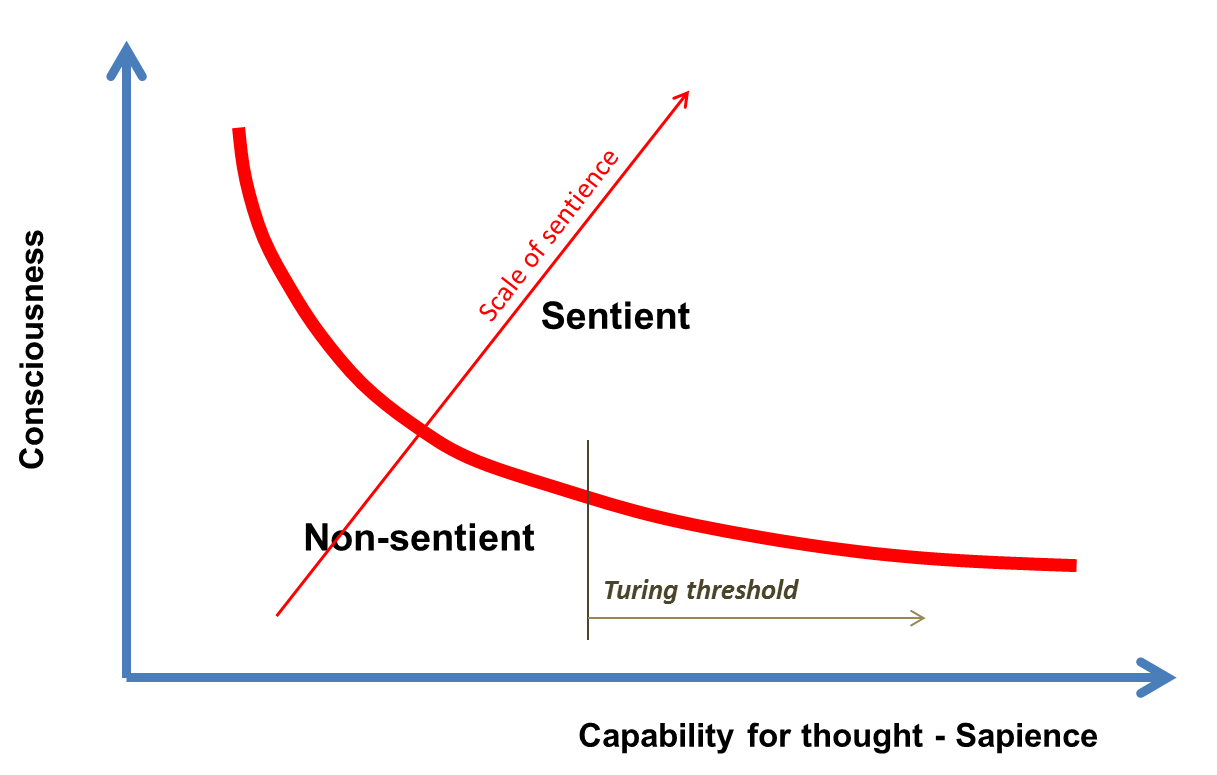David Chalmers makes a terminological
distinction between sentience and sapience:
sentience = phenomenal consciousness
sapience = psychological consciousness
What does this distinction amount to?
sentience = phenomenal consciousness
sapience = psychological consciousness
What does this distinction amount to?
For
a start, a conscious creature “senses and feels”. That is, it is
sentient. This is Chalmers ‘hard problem’:
“Chalmers points out that psychology and neuroscience have made significant progress toward increasing our understanding of sapience – psychological consciousness… In contrast, we seem to have made little or no progress in understanding sentience. What understanding we do have consists mainly in the discovery of brute correlation between conscious episodes and neurological events. The identification of correlation represents at most a starting point for explanation, however, not a settled goal. Unlike the case of sapience, where it is reasonable to expect incremental progress, it is hard to see what we could do to move ahead in our understanding of the basis of consciousness.” - John Heil
Chalmers
is correct to argue that the discovery of brute correlations (or
connections) between conscious states and physical states is only the
beginning of the story – or, at the least, a different story to the
story of sentience altogether. Chalmers last point is very telling,
if not overtly pessimistic. He writes that
“it
is hard to see what we could do to move ahead in our understanding of
the basis of consciousness”.
Perhaps
this word ‘basis’ is incorrectly used here. We do indeed partly
know the basis of consciousness. What we don’t know is the
why-of-consciousness. What we can't explain is why a conscious
state should arise out of such a physical basis in the brain. The
correlates are known; though not why they are correlated.
Some
philosophers seem to offer a way out of this impasse that is, quite
frankly, little more than a cop-out. In general terms, they “hope
that sentience [will be] reducible to sapience” [601]. Surely this
couldn’t be the case.
This
is the position on offer:
"… all there is to being conscious is acting and interacting intelligently in a complex environment (see e.g. Dennet 1991)."
Acting
thus and so is to be conscious. What of feelings and other sensuous
states? These are species of sapient state. Functionalists, for
instance, may hold that, to be in pain is to be in a state with the
right sorts of cause and effect. Pains are caused by tissue damage
and result in aversive behaviour (including the formation of various
beliefs and desires).
This
is indeed a reductive explanation of consciousness. It seems, to me,
to be obviously false and even disingenuous in nature. How could
anyone really believe that consciousness is our acting and
interacting in a complex environment? How could anyone believe that
acting thus and so is to be conscious? No. Consciousness comes
along with interacting intelligently. Consciousness comes along
with functional roles as well. Pain, on the functionalist picture, is
indeed caused by tissue damage. And it's true that pain results in
the right sorts of aversive behaviour (including the formation of
various beliefs and desires about pain and ways of escaping pain).
But all these causes and effects are accompanied by consciousness.
They aren't examples of consciousness. They may even be the
necessary accompaniments of consciousness; though they aren't
sufficient for it. It's is incredible, again, that any philosophy
could uphold these reductive (or functionalist) explanations of
consciousness. And yet they do!










No comments:
Post a Comment